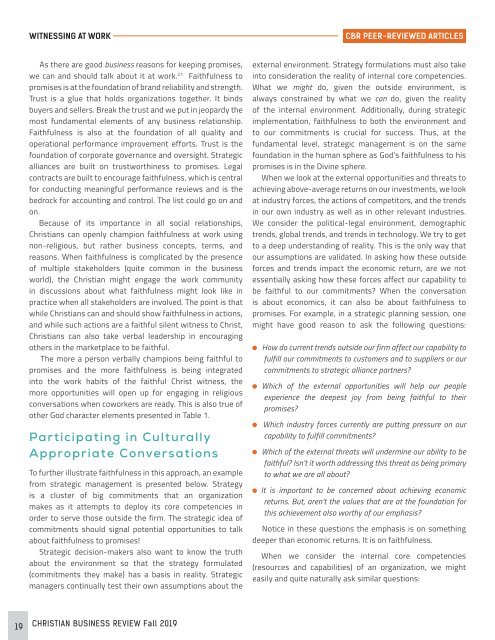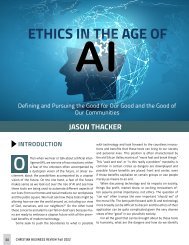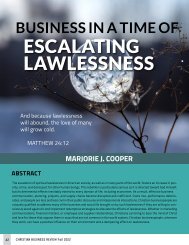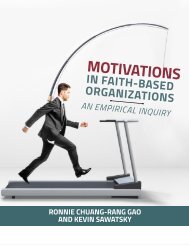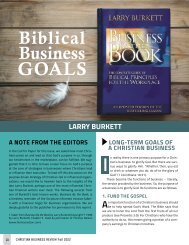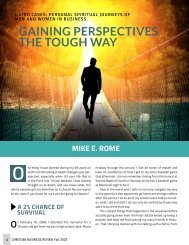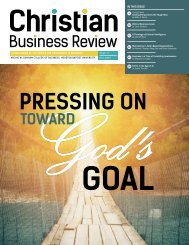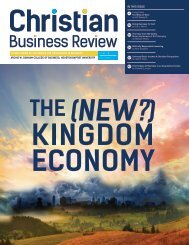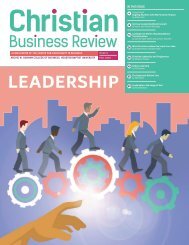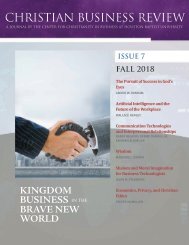Christian Business Review 2019: Workplace Practices That Glorify God (Issue 8)
You also want an ePaper? Increase the reach of your titles
YUMPU automatically turns print PDFs into web optimized ePapers that Google loves.
WITNESSING AT WORK<br />
CBR PEER-REVIEWED ARTICLES<br />
As there are good business reasons for keeping promises,<br />
we can and should talk about it at work. 21 Faithfulness to<br />
promises is at the foundation of brand reliability and strength.<br />
Trust is a glue that holds organizations together. It binds<br />
buyers and sellers. Break the trust and we put in jeopardy the<br />
most fundamental elements of any business relationship.<br />
Faithfulness is also at the foundation of all quality and<br />
operational performance improvement efforts. Trust is the<br />
foundation of corporate governance and oversight. Strategic<br />
alliances are built on trustworthiness to promises. Legal<br />
contracts are built to encourage faithfulness, which is central<br />
for conducting meaningful performance reviews and is the<br />
bedrock for accounting and control. The list could go on and<br />
on.<br />
Because of its importance in all social relationships,<br />
<strong>Christian</strong>s can openly champion faithfulness at work using<br />
non-religious, but rather business concepts, terms, and<br />
reasons. When faithfulness is complicated by the presence<br />
of multiple stakeholders (quite common in the business<br />
world), the <strong>Christian</strong> might engage the work community<br />
in discussions about what faithfulness might look like in<br />
practice when all stakeholders are involved. The point is that<br />
while <strong>Christian</strong>s can and should show faithfulness in actions,<br />
and while such actions are a faithful silent witness to Christ,<br />
<strong>Christian</strong>s can also take verbal leadership in encouraging<br />
others in the marketplace to be faithful.<br />
The more a person verbally champions being faithful to<br />
promises and the more faithfulness is being integrated<br />
into the work habits of the faithful Christ witness, the<br />
more opportunities will open up for engaging in religious<br />
conversations when coworkers are ready. This is also true of<br />
other <strong>God</strong> character elements presented in Table 1.<br />
Participating in Culturally<br />
Appropriate Conversations<br />
To further illustrate faithfulness in this approach, an example<br />
from strategic management is presented below. Strategy<br />
is a cluster of big commitments that an organization<br />
makes as it attempts to deploy its core competencies in<br />
order to serve those outside the firm. The strategic idea of<br />
commitments should signal potential opportunities to talk<br />
about faithfulness to promises!<br />
Strategic decision-makers also want to know the truth<br />
about the environment so that the strategy formulated<br />
(commitments they make) has a basis in reality. Strategic<br />
managers continually test their own assumptions about the<br />
external environment. Strategy formulations must also take<br />
into consideration the reality of internal core competencies.<br />
What we might do, given the outside environment, is<br />
always constrained by what we can do, given the reality<br />
of the internal environment. Additionally, during strategic<br />
implementation, faithfulness to both the environment and<br />
to our commitments is crucial for success. Thus, at the<br />
fundamental level, strategic management is on the same<br />
foundation in the human sphere as <strong>God</strong>’s faithfulness to his<br />
promises is in the Divine sphere.<br />
When we look at the external opportunities and threats to<br />
achieving above-average returns on our investments, we look<br />
at industry forces, the actions of competitors, and the trends<br />
in our own industry as well as in other relevant industries.<br />
We consider the political-legal environment, demographic<br />
trends, global trends, and trends in technology. We try to get<br />
to a deep understanding of reality. This is the only way that<br />
our assumptions are validated. In asking how these outside<br />
forces and trends impact the economic return, are we not<br />
essentially asking how these forces affect our capability to<br />
be faithful to our commitments? When the conversation<br />
is about economics, it can also be about faithfulness to<br />
promises. For example, in a strategic planning session, one<br />
might have good reason to ask the following questions:<br />
How do current trends outside our firm affect our capability to<br />
fulfill our commitments to customers and to suppliers or our<br />
commitments to strategic alliance partners?<br />
Which of the external opportunities will help our people<br />
experience the deepest joy from being faithful to their<br />
promises?<br />
Which industry forces currently are putting pressure on our<br />
capability to fulfill commitments?<br />
Which of the external threats will undermine our ability to be<br />
faithful? Isn’t it worth addressing this threat as being primary<br />
to what we are all about?<br />
It is important to be concerned about achieving economic<br />
returns. But, aren’t the values that are at the foundation for<br />
this achievement also worthy of our emphasis?<br />
Notice in these questions the emphasis is on something<br />
deeper than economic returns. It is on faithfulness.<br />
When we consider the internal core competencies<br />
(resources and capabilities) of an organization, we might<br />
easily and quite naturally ask similar questions:<br />
19<br />
CHRISTIAN BUSINESS REVIEW Fall <strong>2019</strong>


